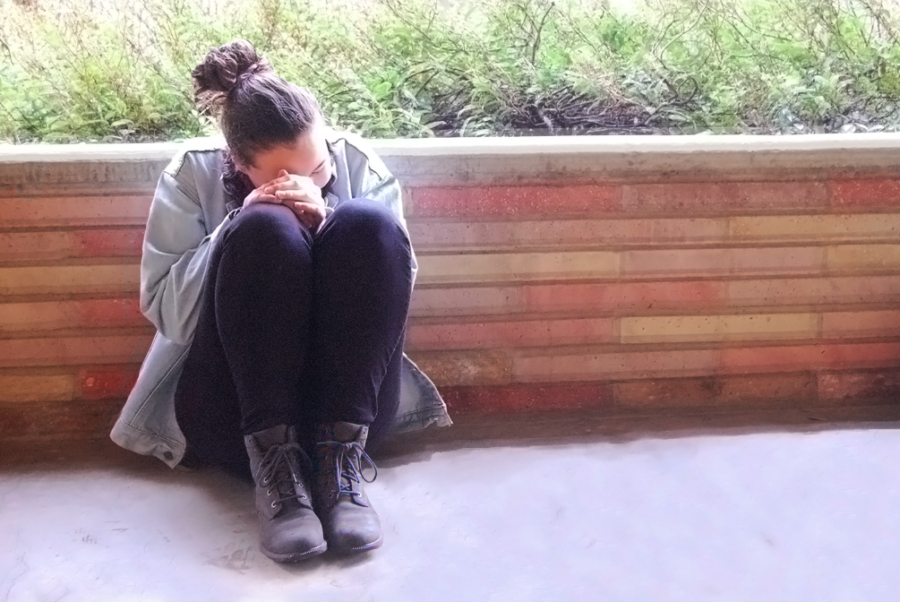Tremors wrack your body. Your lungs aren’t cooperating. Everything blurs. You open your mouth but nothing comes out. So many thoughts are running through your head that you can’t focus.
That’s how sophomore Alexandra Gische feels when she has a panic attack. In September 2018, Gische was diagnosed with generalized anxiety disorder, which she describes as high levels of anxiety that make it difficult to function in daily life.
“I need more time to breathe after doing things. I can’t just dive into something else, because things are very draining,” Gische said.
According to the Anxiety and Depression Association of America, generalized anxiety disorder is a “persistent and excessive worry about a number of different things.” Although people with anxiety know their worrying is more intense than it should be, they still cannot control it.
This disorder affects many aspects of life. From schoolwork to socializing with other people, anxiety is the always-present threat to the well-being of someone with an anxiety disorder.
For Gische, everyday interactions like ordering food or asking about missed schoolwork are physically and mentally demanding.
“[My anxiety] makes talking to people very difficult because it takes so much energy to not freak out. I’m constantly worrying about things,” Gische said.
Anxiety doesn’t stop at interactions. Gische’s anxiety also extends into her schoolwork, which in itself can be overwhelming and stressful for people with and without a generalized anxiety disorder.
“Anxiety makes it difficult to focus because I have lots of things on my mind at once, so I’m all over the place,” Gische said, “It makes listening to lectures or doing homework hard. I find that my mind wanders quite a bit. Just being in school, there are so many people, it’s overwhelming sometimes.”
Although she can feel overwhelmed, Gische has a great support system. Her friends are there to help her every step of the way.
“I think they understand my anxiety better than my parents do. They talk to me if I need to, they will hug me if I need it, or just sit with me while I’m in tears just so I can know they’re there for me,” Gische said.
Matias Pollan, a sophomore, is a close friend and supporter of Gische. He also has anxiety, and his advice for supporting people with mental illness is to comfort them in times of need and let them know that you’re there if they need anything.
Although support from friends and family is important, it is important for people with anxiety to know that they’re not alone in this struggle.
“You can find other people who have anxiety and build trust in one another,” Pollan said.
Having anxiety can be difficult because of all the challenges it causes. The constant worry and feeling of being overwhelmed can limit the quality of a person’s daily life.
However, anxiety comes with more than just mental difficulties. The physical symptoms of anxiety can also be troubling to experience.
The Anxiety and Depression Association of America published a report of statistics for anxiety which stated that only 43.2 percent of people with generalized anxiety disorder receive treatment. Adolescents who have not received treatment for their anxiety disorder are more likely to misuse drugs and alcohol, do poorly in school, and forego experiencing crucial social experiences.
The association also explains that there are many forms of treatment available, such as forms of therapy, medication, and relaxation techniques.
Currently, Gische is going through therapy and is trying medication to help with her anxiety.
A different method that can help relieve anxiety is performing relaxation techniques. A report by the University of Michigan Medicine explains that these techniques can help people lessen body tension, deal with an overwhelming amount of thoughts, and calm down with deep breathing.
Furthermore, the Anxiety and Depression Association of America says that physical exercise can ease some symptoms of anxiety. Exercise can help people cope with stress, which helps lessen anxiety.
In addition to help from therapists, friends, and family, Carlmont High School has a support program to help students manage anxiety as well as many other difficulties.
Carlmont’s therapist and crisis counselor Shelley Bustamante is in charge of a program called Students Offering Support (SOS). She offers a welcoming atmosphere to all students.
“SOS offers these students support, counseling, a time out, mindfulness/breathing exercises, and a quiet room to make up work, rest or reboot,” Bustamante said.
It’s important for people with anxiety to have a good support system that lessens the hardships they face and allows them to thrive.
Gische said, “Get the help you need because I know a lot of people don’t. Reach out, it’s hard. Try to find the things that help you calm down and help you cope.”



